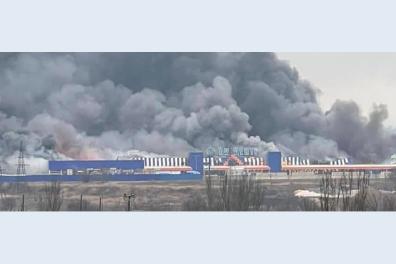Anthropocene in the East" workshops: a look at environmental issues in Eastern Europe and the former USSR

Dossier designed by the "Environment" team of the Centre d'études des mondes russes, caucasien et centre-européen-CERCEC (CNRS-EHESS) in partnership with the Centre de recherche Europes-Eurasie-CREE (Inalco).
Coordinated by Marin Coudreau (CERCEC, CNRS) and Laurent Coumel (Inalco - CREE).
This publication follows on from the round table Russia's war in Ukraine. Environmental issues (video hosted on Hal-Campus AAR - 2h13mn) organized on June 16, 2022 by CREE with the support of CERCEC (CNRS, EHESS) and the ANR-DFG project "EnviroHealth".
"Russia's war in Ukraine. Environmental issues"
"The Russian war in Ukraine. Environmental issues"
The Russian army's invasion of Ukraine on February 24, 2022 caused immense destruction to human life, infrastructure and ecosystems. The return of war to this region, which has a large and aging industrial apparatus inherited from the Soviet period, is causing great concern. Bombing of chemical and steel plants, fighting around nuclear facilities, destruction and contamination of ecosystems by armies: environmental and health damage is increasing as the fighting continues, and the toxic legacy of this violence is worrying for the post-war period. This workshop offers an overview of the ongoing destruction and some of the environmental risks that are accumulating in the region.
The interrelationships between war and the environment have been one of the most prolific subfields of environmental history over the past two decades. French historians Christophe Bonneuil and Jean-Baptiste Fressoz have even coined a neologism, the "thanathocene", to characterize the predominant role played by modern warfare and the military apparatus in the advent of the Anthropocene. The environmental damage of modern warfare has been well documented since the ecocide of the Vietnam War, but the current Russian aggression in Ukraine is generating an unprecedented level of attention to the environmental impacts of war from a wide range of NGOs, activists, journalists or researchers.
Summary
- Ukraine at war, environment at risk. Interview with Nickolai Denisov, by Nickolai Denisov, expert at the NGO Zoï Environment Network (Geneva)
In English: Ukraine at War, Environmental Threats.
- "Ukraine's peaceful atom and war: environment and security in question", by Tatiana Kasperski, sociologist (Barcelona)
In English: "The Ukrainian Peaceful Atom in Times of War: Environmental and Safety Concerns"
"Anthropocene in the East"
Anthropocene in the East
Spaces of experience and horizons of expectation of ecological crises in post-communist societies
The "Anthropocene in the East" workshops aim to shed light on this return of the environmental question in Central and Eastern Europe and the former USSR, through the prism of historical legacies, and more broadly of what Reinhart Koselleck has termed the "space of lived experience", by linking it to the "horizon of expectation" of actors. It is this present, both dependent on the past and in the process of becoming, that the human and social sciences seek to grasp.
Dossier n° 1. "Anthropocene in the East. 2020, a red tide in Siberia"
The dossier 2020, a red tide in Siberia, coordinated by Laurent Coumel (Inalco - CREE), aims to link current environmental issues and SHS research in the Russian and Eastern European areas. It features several analytical articles on the ecological catastrophe in the Russian Arctic.